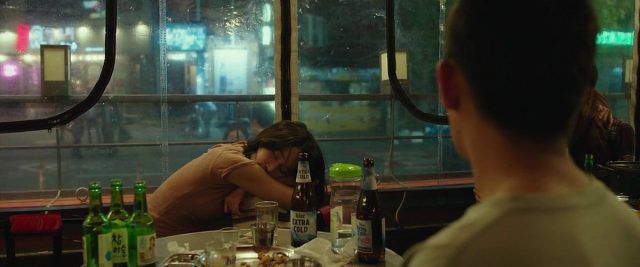Burning: You Versus the Guy She Told You Not To Worry About, by Scott Nye
Jealousy, class divisions, sex, arson, and spying all work their way into Lee Chang-Dong’s Burning, a terrific new thriller that seizes the anxieties of our present extraordinarily well, forging from them the meat of our entrenched, existential troubles. Adapted from a 1983 Haruki Murakami short story, which may in turn have taken some thematic – though little in the way of narrative – inspiration from a 1939 William Faulkner yarn, with a heavy investment in the texture of the present, Lee uses that vast history to his advantage. Despite the presence of Donald Trump on TV, of North Korean missile tests just over the horizon, of the influx of new money into poor lives, Burning is not explicitly about 2018, but a natural byproduct of it. We all live with these anxieties all of the time. Plus whatever our own lives bring.
Jongsu (Yoo Ah-in) certainly has his share. Barely making ends meet as a day laborer, his father’s assault trial has caused their ramshackle home and family farm to fall into further disrepair, and just when he thought he scored a new girlfriend after reconnecting with childhood friend Haemi (Jun Jong-seo), wouldn’t you know it she takes a trip to Africa and comes back with the offensively attractive, charming, and rich Ben (Steven Yeun). Jongsu has absolutely no game; he lucked into a one-night stand with Haemi and has been extrapolating a relationship out of that the entire time she’s been away. Now that she’s back and clearly only interested in him as a friend, he’s completely uncertain where he stands with either of them, increasingly frustrated, but unable to say “no” to even the most spur-of-the-moment gathering, just to spend a bit of time with Haemi and find some way to gain the upper hand for her affection.
It’s not going to happen of course, and Jongsu finally forces the tensions between the three of them into the fore with a careless comment after a long, marijuana-singed evening that a wiser man would have logged away as one of the best of his life. Here, he finally connects a bit with Ben, Haemi has found total peace, and Jongsu himself finds cause to take a bit of pride in his modest life. But wisdom is nothing compared to the rampant sexual jealousy that courses through young men. I don’t know if Lee is conscious or not of the larger incel/MRA movements worldwide that are dominated by pathetic men seeking to dominate women, but the film is not unconcerned with this mindset. Rather, it so entrenches us in it that one can momentarily believe we’re seeing something heroic and honorable, when all of Jongsu’s actions point back to this feeling that he deserves Haemi in a way Ben does not. His insult to her stems entirely from this sense of ownership, and from this point, the film’s thriller instincts – once bubbling under the surface, slowly start emerging in full force.
Early on, Burning takes great interest in the things we know but cannot see. Haemi talks a lot about the pleasures of imagination, and while she’s in Africa, Jongsu is tasked with feeding a cat he never sees. Burning focuses exclusively on Jongsu’s point-of-view, and he spends much of the film wondering what everybody else is up to. This uncertainty perfectly sets the stage for the thriller elements without ever foreshadowing or insisting upon their imminence. Less than half the film has the overt form of a thriller, and yet, because it keeps tapping into modern anxiety triggers – Trump, North Korea, urban/rural divides, class divides – it seems inevitable that something’s going to give.
I won’t get into what exactly transpires, but it’s very much about the way people with money use those without as fodder, and the way the poor tend to accept this cycle as a means of at least momentarily living the high life. A lot of this is expressed in the actors’ physicality – the way Yeun plays a relaxed observer more than an active participant every time he’s with Jongsu and Haemi; the way Jun, in turn, seems to constantly insist on her comfort in his beautiful car and apartment, a mess of nervous energy constantly asserting itself in a way she didn’t when it was just she and Jongsu at cheap diners or her tiny apartment; and the way Yoo seems to always be leaning into these spaces, as if trying to catch pieces of it that everyone else missed. These qualities greatly inform the way things unfold in the back half, another way for Lee to establish character and have it pay off in unexpected ways.
This capacity to constantly toy with and upend our expectations does make the conclusion – which is just the most obvious place to wind up – feel mighty disappointing. I hesitate to even bring it up both because it’s not fun discussing an ending most readers have not seen, and any negative word has a way of sinking films outside the mainstream for too many viewers. What I will say is that it hardly invalidates all that had gone on before. Burning is so tuned into not only modern topics, but more importantly the modern feeling that we’re steps from ruination, we can’t seem to dig ourselves out, and we’re terrified of all the forces larger than ourselves and whatever pain we’ve inherited from our families and our nature. Jongsu is an angry young man disguised as a nice guy, and like a lot of angry young men, has nowhere to put that boiling rage. Lee doesn’t critique this, nor does he honor it; Burning is fascinated by it, and a little afraid.

























